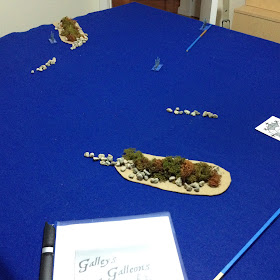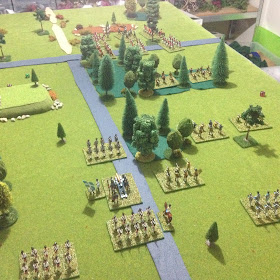 |
| The chase is on as and second ship lays in wait to spring the trap |
 |
| Unaware of a trap the Spanish Galleon closes the gap |
 |
| A change in wind direction went against the ambushers and favoured the Spanish |
 |
| The Spanish catches up and delivers a devastating broadside |
 |
| All ships close and exchange shots |
 |
| With one Privateers having sustained heavy damage and both decide to break off the engagement |
 |
| An English ship waits for the Spanish ship to make a break. |
 |
| The Spanish finally make a break for it |
 |
| The English ship closes and engages. |
 |
| Both ships tack across the board firing when possible |
 |
| The Spanish ship slips free |
With those two games my 6x6 challenge is complete. A most enjoyable challenge set at the start of this year by Kaptain Kobold and got me playing some rulesets purchased but never played. My favourite challenge games was the Hundred Years War series which ended up running for 10 games as part of a mini-campaign.
The completed list...
- Tank-on-Tank (Lock 'n' Load Publishing) SciFi Variant - 6 games completed in February
- Dark Ages with Dux Bellorum (Osprey) - 6 games completed in January using paper armies
- WW2 Naval (Pz8 rules) - 6 games now completed in July.
- 19th Century European Imagi-Nations OHW Variant - 6 played. The final games were played in August.
- Galleys and Galleons (Ganesha Games) - 6 games completed in October.
- Hundred Years War using Lion Rampant (Osprey) - 6 games completed as part of a series of campaign games.






































